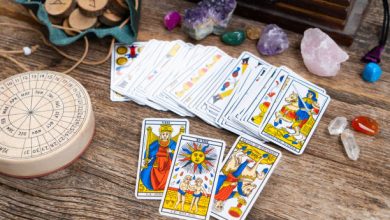Can Tarot Predict Extra-Marital Affairs? Exploring the Cards Used to Predict Infidelity – AstroTalk Blog
Tarot, an ancient divination tool, has long been associated with unveiling hidden truths and providing insights into various aspects of life. One topic that often intrigues individuals seeking guidance is the possibility of tarot predicting extra-marital affairs. While tarot cards can offer valuable perspectives and shed light on underlying dynamics, it is important to understand their limitations when it comes to predicting the complex realm of human relationships. In this article, we will explore the use of tarot cards in predicting extra-marital affairs and discuss the cards commonly associated with infidelity.
Tarot as a Tool for Insight
Tarot is a symbolic system that helps individuals gain clarity and deeper understanding of their lives. Through the use of a tarot deck, which consists of 78 cards, readers tap into their intuition and interpret the cards’ meanings within the context of a specific question or situation. It is important to note that tarot readings are not set in stone predictions, but rather a reflection of the energies and possibilities surrounding the question at hand.
Also Read Seeking tarot guidance can tarot cards help mend a strained relationship
Extra-Marital Affairs and Tarot
The concept of extra-marital affairs is a sensitive and complex topic that involves the intertwining of emotions, desires, and human choices. While tarot can provide insights into relationship dynamics, it should be understood that it cannot definitively predict whether an individual will engage in an extra-marital affair. Instead, tarot can help identify potential factors, emotions, or challenges that may contribute to such situations.
Also Read Tarot for Self Discovery
Tarot Cards Associated with Infidelity
In a tarot reading focused on relationships, certain cards may suggest the presence of infidelity or the potential for it to occur. It is crucial to remember that these cards indicate possibilities and not certainties. Here are a few cards that are commonly associated with extra-marital affairs:
- The Lovers: While the Lovers card may represent romantic relationships and deep connections, it can also reveal a need for making choices between two individuals. It may signify temptations and dilemmas that could lead to infidelity if not addressed honestly and responsibly.
- The Devil: The Devil card often symbolizes a sense of entrapment, addiction, or unhealthy attachments. In the context of extra-marital affairs, it can represent the seductive allure of forbidden relationships, hidden desires, or destructive patterns that could potentially lead to betrayal.
- The Seven of Swords: This card can indicate deceit, secrecy, or dishonesty. It may suggest that someone is contemplating or engaging in unfaithful behavior. However, it is essential to consider the context of the reading and explore other cards to gain a comprehensive understanding.
- The Three of Swords: The Three of Swords traditionally represents heartbreak, sorrow, and emotional pain. In relation to infidelity, this card could signify the aftermath of an affair or the emotional repercussions it may bring to those involved.
Conclusion
Tarot is a powerful tool for self-reflection and gaining insights into various aspects of life, including relationships. While it can provide indications or highlight potential challenges related to extra-marital affairs, it is crucial to approach tarot readings with an open mind and understand that they do not guarantee specific outcomes. Tarot should be used as a means to gain self-awareness, explore emotions, and make informed decisions based on the insights gained.
When seeking guidance on sensitive matters like extra-marital affairs, it is advisable to consult a professional and ethical tarot reader who can provide a compassionate and objective interpretation of the cards. Ultimately, it is up to individuals to navigate their relationships with honesty, respect, and clear communication to build trust and maintain the integrity of their commitments.
Connect with Astrologers on Numerologybox
Want to know exactly when your tarot card will reveal who your “Soul Flame” is, and when you’ll cross paths? Check out this free Soul Flame Reading that I love to do by clicking the image below:
Source: https://numerologybox.com
Category: Tarot







